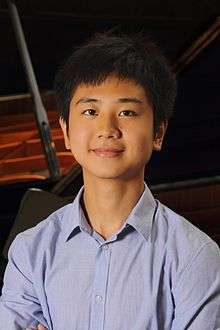Xu Qi
Qi Xu (Chinese: 徐起; born September 26, 1994) is a Chinese pianist.
Xu Qi 徐起 | |
|---|---|
 Xu at age 21 | |
| Background information | |
| Born | 1994 (age 25–26) Shenzhen, China |
| Genres | Classical |
| Occupation(s) | Pianist |
| Instruments | Piano |
| Years active | 2008–present |
Early life and education
Xu was born in Shenzhen, began studying piano at six, and entered Shenzhen Art School at age 10, studied with Professor Dan Zhaoyi, who is one of the most prestigious piano teachers in China.
In 2009, Xu was accepted by the Juilliard School and the Curtis Institute of Music with the highest score in both of the entrance auditions. He attended the Juilliard School and followed Professor Kaplinsky, the chairwoman of the Piano Department of Juilliard. Meanwhile, he studied academics at the Professional Performing Arts School (PPAS) in New York. In 2012, Qi Xu entered Columbia University (CC'16) and was designated as a John Jay Scholar. He majors in Mathematics and Philosophy, and continues to study piano with Prof. Kaplinsky in the Columbia-Juilliard Exchange Program. In 2014, Qi was selected as one of the Columbia-Oxbridge Scholars to further study at Cambridge University for his junior year. In the meantime, he studies piano with Professor Christopher Elton, former Head of the Keyboard department of the Royal Academy of Music in London.
Career
In 2008, Xu was the recipient of all the four international and national piano competitions in which he participated,[1] including the first prize in the 9th Krainev International Piano Competition (Junior Group) held in Ukraine and the second prize in the 11th Ettlingen International Youth Piano Competition in Germany, where he was the only 14-years-old youngest one in Senior Group (age up to 20). In 2011, Qi Xu won the first prize and the orchestra prize in the 11th Morocco International Piano Competition (Casablanca).[2] He is the youngest candidate ever received at this stage of the competition.
Since 2008, Xu had many performances all around the world including China, Poland, Ukraine, Germany, France, Morocco and USA. In December 2009, he performed in Cortot Hall Paris, and has performed there several more times since then. In April 2010, Xu was invited by Television Spain to record a program “Young Soloist” which had been broadcast sixteen times. He made concert tour to several cities in Poland in 2012 and 2013, and recorded his first album "Qi Xu Plays Beethoven, Liszt, Stravinsky" there in 2013. In the summers from 2010 to 2014, he participated the Long Island piano festival "Pianofest" and the Aspen Music Festival respectively. He is one of the pianists performed in the Rising Stars Piano Recital Series held annually in Long Island.[3]
References
External links
- Bach: WTC I No.3 in C Sharp BWV 848
- Beethoven: Piano Sonata No.3 in C Major, Op.2 No.3
- Beethoven: Piano Sonata No.25 in G Major, Op.79
- Beethoven: Piano Sonata No.30 in E Major, Op.109
- Liszt: Etudes d'Execution Transcendante No.5 'Feux Follets'
- Liszt: Tarantella (Venezia e Napoli No.3)
- Chopin Etude Op.10 No.4, No.5 “Black Keys”
- Chopin: Etude Op.10 No.8
- Chopin: Ballade No.3 in A Flat Major, Op.47
- Schumann: Kinderszenen No.1 - Of Foreign Lands and People
- Schubert: Impromptu D899 Op.90 No.2
- Schubert: Impromptu D899 Op.90 No.3
- Stravinsky: Petrushka (Piano)
- Prokofiev: Romeo and Juliette - Montagues and Capulets
- Chinese Piano Piece: Autumn Moon over the Calm Lake